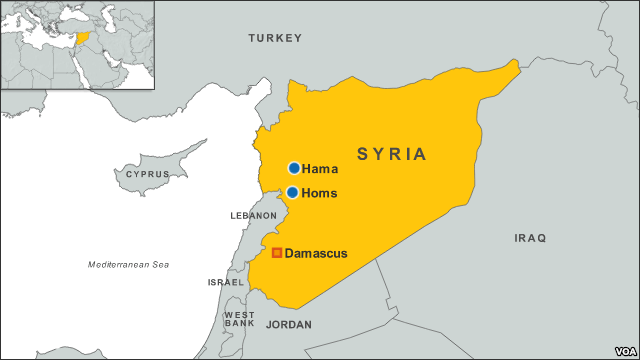Syrian rights activists said the death toll from a suicide car bombing in the central province of Hama late Monday has risen to at least 42 people.
 The Britain-based Syrian Observatory for Human Rights said the attack targeted a building used by pro-government militiamen in the town of Salamiyah. It said civilians were among the dead.
The Britain-based Syrian Observatory for Human Rights said the attack targeted a building used by pro-government militiamen in the town of Salamiyah. It said civilians were among the dead.
Syrian state news agency SANA gave a death toll of 32 people and blamed the bombing on terrorists whom it said are behind a 22-month rebellion against President Bashar al-Assad.
U.N. Secretary-General Ban Ki-moon described the situation in Syria as a “calamity.” Speaking at a Tuesday news conference outlining his 2013 agenda, he said the Syrian civil war is his “main immediate test.”
“The humanitarian situation is dire and getting worse and worse. Millions of people are struggling to survive. More than 650,000 people have fled the country,” said the U.N. chief. “Lack of food and denial of access to medical treatment, inadequate shelter and heating during a harsh winter are taking their toll.”
Ban called on U.N. members to send senior delegations to an international donor conference for Syria, to be held in Kuwait on January 30.
The U.N. chief also said he reviewed the crisis with special envoy Lakhdar Brahimi on Monday.
“Our shared assessment is that we are still a long way from getting the Syrians together. The key decisions about the country’s future are in the hands of the Syrians,” he said. “But, the international community, and in particular the Security Council, has a grave responsibility to act to bring the desperate suffering of the Syrian people to an end.”
In other developments, the Syrian Observatory for Human Rights reported deadly battles between mostly Sunni anti-government rebels and minority Kurdish fighters in the northeastern town of Ras al-Ain, on the border with Turkey.
It said at least 56 fighters have been killed in a week of fighting in the area. Syria’s minority Kurds have largely remained on the sidelines of the majority-Sunni led rebellion, but have long sought greater autonomy from Damascus.
The Observatory also said pro-Assad troops and rebels engaged in more battles in Damascus province on Tuesday.
Meanwhile, dozens of Russians boarded buses from Syria to neighboring Lebanon in the first evacuation organized by Moscow since the start of the Syrian uprising in 2011.
The Russian government had sent two planes to the Lebanese capital Beirut to fly the Russians back home. Syria’s main international airport outside Damascus has been largely devoid of traffic in recent weeks due to fighting along the road to the capital.
Russia is one of the few remaining international allies of Mr. Assad’s government. But, it has been distancing itself from the Syrian leader, acknowledging that he may be ousted by the uprising.
The foreign minister of Saudi Arabia, Saud al-Faisal, one of Mr. Assad’s strongest regional opponents, expressed support for the Syrian opposition’s refusal to negotiate with Damascus.
“Damascus, which is the oldest remaining city that has been a city for the oldest period of time, is carpet bombed,” he said. “How can you conceive of the possibility of negotiated settlement with somebody who does that to his own country, to his own history, to his own people? It is inconceivable to us.”
Addressing a news conference in Riyadh, al-Faisal criticized the U.N. Security Council for failing to agree on how to end the Syrian conflict.
“We have a call to make to the Security Council to finally show the responsibility that they must show in front of the trust that was put in him, or otherwise I think it is the duty of the General Assembly to censure the Security Council for failing in its duty,” he said.
VOA













